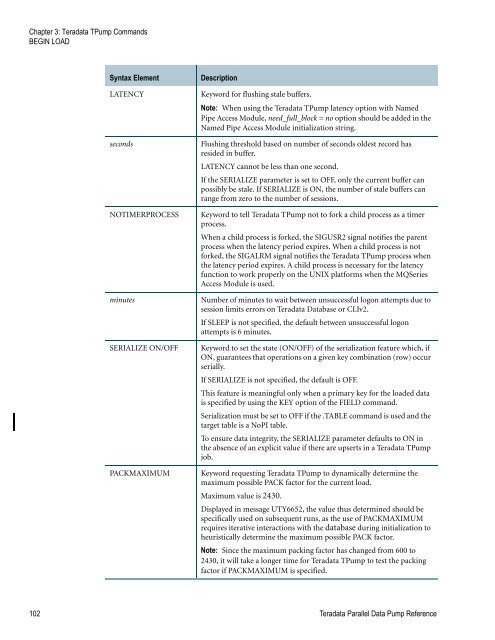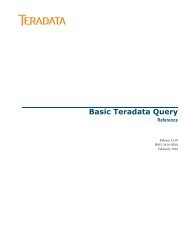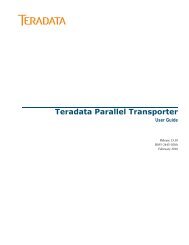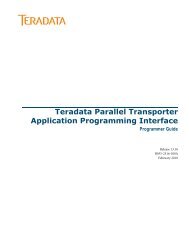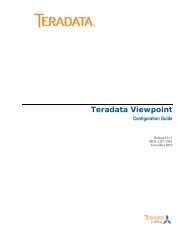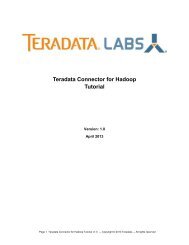Teradata Parallel Data Pump
Teradata Parallel Data Pump Reference - Teradata Developer ...
Teradata Parallel Data Pump Reference - Teradata Developer ...
- No tags were found...
You also want an ePaper? Increase the reach of your titles
YUMPU automatically turns print PDFs into web optimized ePapers that Google loves.
Chapter 3: <strong>Teradata</strong> T<strong>Pump</strong> Commands<br />
BEGIN LOAD<br />
Syntax Element<br />
LATENCY<br />
seconds<br />
NOTIMERPROCESS<br />
minutes<br />
SERIALIZE ON/OFF<br />
PACKMAXIMUM<br />
Description<br />
Keyword for flushing stale buffers.<br />
Note: When using the <strong>Teradata</strong> T<strong>Pump</strong> latency option with Named<br />
Pipe Access Module, need_full_block = no option should be added in the<br />
Named Pipe Access Module initialization string.<br />
Flushing threshold based on number of seconds oldest record has<br />
resided in buffer.<br />
LATENCY cannot be less than one second.<br />
If the SERIALIZE parameter is set to OFF, only the current buffer can<br />
possibly be stale. If SERIALIZE is ON, the number of stale buffers can<br />
range from zero to the number of sessions.<br />
Keyword to tell <strong>Teradata</strong> T<strong>Pump</strong> not to fork a child process as a timer<br />
process.<br />
When a child process is forked, the SIGUSR2 signal notifies the parent<br />
process when the latency period expires. When a child process is not<br />
forked, the SIGALRM signal notifies the <strong>Teradata</strong> T<strong>Pump</strong> process when<br />
the latency period expires. A child process is necessary for the latency<br />
function to work properly on the UNIX platforms when the MQSeries<br />
Access Module is used.<br />
Number of minutes to wait between unsuccessful logon attempts due to<br />
session limits errors on <strong>Teradata</strong> <strong>Data</strong>base or CLIv2.<br />
If SLEEP is not specified, the default between unsuccessful logon<br />
attempts is 6 minutes.<br />
Keyword to set the state (ON/OFF) of the serialization feature which, if<br />
ON, guarantees that operations on a given key combination (row) occur<br />
serially.<br />
If SERIALIZE is not specified, the default is OFF.<br />
This feature is meaningful only when a primary key for the loaded data<br />
is specified by using the KEY option of the FIELD command.<br />
Serialization must be set to OFF if the .TABLE command is used and the<br />
target table is a NoPI table.<br />
To ensure data integrity, the SERIALIZE parameter defaults to ON in<br />
the absence of an explicit value if there are upserts in a <strong>Teradata</strong> T<strong>Pump</strong><br />
job.<br />
Keyword requesting <strong>Teradata</strong> T<strong>Pump</strong> to dynamically determine the<br />
maximum possible PACK factor for the current load.<br />
Maximum value is 2430.<br />
Displayed in message UTY6652, the value thus determined should be<br />
specifically used on subsequent runs, as the use of PACKMAXIMUM<br />
requires iterative interactions with the database during initialization to<br />
heuristically determine the maximum possible PACK factor.<br />
Note: Since the maximum packing factor has changed from 600 to<br />
2430, it will take a longer time for <strong>Teradata</strong> T<strong>Pump</strong> to test the packing<br />
factor if PACKMAXIMUM is specified.<br />
102 <strong>Teradata</strong> <strong>Parallel</strong> <strong>Data</strong> <strong>Pump</strong> Reference


